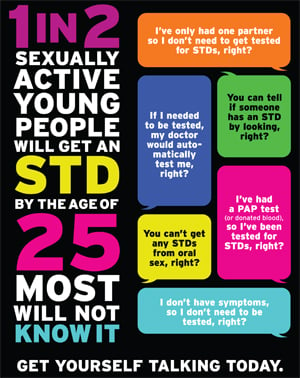GYT Testing FAQs
STDs are very common...and so are questions around getting tested. Here are some of the most common ones we hear.
Why should I get tested for STDs?
Every year there are more than 19 million new cases. If you think it won't happen to you...think again. Since STDs often show no symptoms, many of those infected don't even know it. The only way to know if you or partner has an STD is to get tested.
Here's the good news: ALL STDs are treatable and MANY are curable.
 Wouldn't I know if I or my partner had an STD?
Wouldn't I know if I or my partner had an STD?
The only way to know if you or anyone else has an STD is to get tested. You can’t always tell by the way someone “looks.” STDs are very common, and it only takes one sexual experience to get one. Even more to the point: STDs, including HIV, often have NO symptoms. Zero. That’s right. So, many people who are infected don’t even know it! Want to know for sure? Then Get Yourself—and Your Partner—Tested (GYT). Knowledge is power! Know yourself. Know your status. GYT.
What if I have an STD but I don't seek treatment?
Putting off getting care for an STD can have lasting health effects for both women and men. Left untreated, some STDs can cause infertility (that is, make you unable to have children). Some can also increase your risk of getting cancer. And get this—already having an STD increases your risk of getting HIV and other STDs if you have sex with an infected partner.
If you notice any changes or irritations “down there,” or any unusual discharge or discomfort when urinating, you should see a health care provider immediately as these may be signs of an STD. However, not all genital infections are STDs. STDs can often be mistaken for common infections or irritations. For example, bumps like pimples or hair follicles on or around the genitals may be confused for genital warts. Women often confuse STDs with yeast infections and other conditions. That’s why it’s important to see a health care provider, who can determine what (if any) STDs you should be tested for.
Not everyone likes to talk about their sexual history. But, before you start a new sexual relationship, it’s a good idea to talk with your partner about your sexual history and getting tested for STDs. After all, you are not just having sex with your partner but with everyone they’ve had sex with…and everyone they’ve had sex with…and well, you get the point. It can be intimidating to think about, but taking charge and getting tested will help you take control over the situation.
Which STDs should I get tested for?
STDs are not like allergies; you can’t do a massive test for all the major ones out there. STD tests are specific to each infection. You and your health care provider will decide which STDs you should be tested for. But most importantly you need to speak up and ask to get tested. You can’t assume that you have been tested for STDs if you have had blood taken, given a urine sample, or (for women) had a pelvic exam or pap test. If you want to know, ASK to be tested.
Be honest and open with your health care provider about your sexual history. They are there to help you, not to judge you. The doc will help you make important decisions about test(s) you may need. Certain STDs are so common that your health care provider may suggest that you get tested regularly for them.
What's involved in testing?
Okay, so you’ve decided to get tested. Now what? The type of test—or tests—you need can vary depending on your age, sex, sexual history, and which STD you’re getting tested for. Remember, there is no single test that can screen for all STDs.
Your test may include:
- Physical exam – Your health care provider may examine you for any signs of an infection, such as a rash, discharge, sores, or warts. For women, this exam can be similar to a pelvic exam.
- Urine sample – You may be asked to pee into a cup at your clinic/doctor’s office. Urine samples can be used to test for chlamydia and gonorrhea.
- Discharge, tissue, cell or oral fluid sample – Your provider will use a swab to collect samples that will be looked at under a microscope. These samples can test for certain STDs, like chlamydia, gonorrhea, herpes, or HIV.
- Blood sample – Your provider may take a blood sample, either with a needle or by pricking the skin to draw drops of blood. These can be used, for example, to test for syphilis, herpes, or HIV.
Make sure you know what you’re being tested for.
Sometimes a diagnosis can be made based on symptoms or a physical exam. Treatment could be prescribed right away. Other times, your provider may need to send a sample away to a lab. Waiting for results can be stressful. Always follow up! If you don’t get your results, it’s as good as not having been tested. Don’t assume your results are negative if you don’t hear back—find out for sure.
Where can I get tested?
Planned Parenthood of Northern New England can test and treat you for sexually transmitted diseases and infections. Call 1-866-476-1321 or click here to make a convenient, confidential appointment at one of our 21 health centers across Maine, New Hampshire and Vermont.